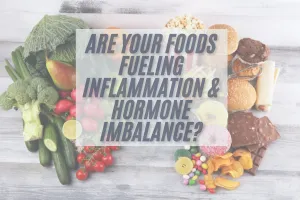FREE Meal Prep Guide: 20 Client-Favorite, Easy Recipes Inside
LEARN WITH
ALISON WILLS
Discover the tools, insights, and support to transform your life and embrace your fullest potential.

How Inflammatory Foods Disrupt Your Hormones (And What to Eat Instead!)
How Inflammation-Causing Foods Impact Hormones
Hormones are the body’s unsung heroes, quietly regulating everything from mood to metabolism. But did you know that what you eat can dramatically impact your hormonal balance? Specifically, inflammation-causing foods like processed sugar, refined carbohydrates, and trans fats can wreak havoc on your hormones, creating a cascade of disruptions.
Let’s break down how inflammation from food can interfere with hormone production and balance—and more importantly, what you can do about it.
1. Increased Cortisol Levels: Stress Hormone Overload
Inflammatory foods like processed sugars cause blood sugar to spike and crash, leaving your body scrambling to stabilize itself. This triggers the release of cortisol, your stress hormone, which is designed to help manage short-term emergencies.
But when sugar spikes happen frequently, your cortisol levels remain elevated. Over time, chronic cortisol elevation can:
Disrupt progesterone, estrogen, and insulin balance.
Leave you feeling fatigued, moody, and struggling with stubborn weight gain.
2. Insulin Resistance: The Domino Effect on Hormones
Processed foods, especially those high in sugar, force your pancreas to release large amounts of insulin. Insulin helps your cells absorb glucose for energy, but when overworked, your cells can become less responsive, resulting in insulin resistance.
Insulin resistance doesn’t stop there—it has a domino effect on your hormones:
It contributes to polycystic ovary syndrome (PCOS) by raising androgen (male hormone) levels.
It increases fat storage around the belly, which further fuels inflammation and throws off estrogen balance.
3. Estrogen and Progesterone: A Delicate Balance Disrupted
Inflammation caused by poor dietary choices interferes with your liver’s ability to metabolize and detoxify excess estrogen, leading to estrogen dominance. Symptoms of estrogen dominance include:
PMS and heavy periods.
Mood swings and irritability.
Weight gain, particularly around the hips and thighs.
At the same time, inflammation can also suppress progesterone production, your body’s natural calming hormone. This can worsen symptoms like anxiety and insomnia, leaving you feeling more out of balance.
4. Thyroid Hormone Disruption: Slowing Down Your Metabolism
Your thyroid, the master regulator of metabolism, doesn’t escape the effects of inflammation. A diet high in processed foods can interfere with the conversion of T4 (inactive thyroid hormone) to T3 (active thyroid hormone). This disruption can lead to:
Persistent fatigue.
Brain fog.
Weight gain.
5. Gut Health and Hormones: A Hidden Connection
Your gut plays a significant role in hormone regulation, from detoxifying estrogen to producing serotonin (your feel-good hormone). Foods high in sugar and refined carbs feed harmful gut bacteria, causing gut dysbiosis.
This imbalance in gut bacteria can:
Increase inflammation throughout the body.
Worsen symptoms like mood swings, cravings, and brain fog.
Actionable Tips to Combat Inflammation and Support Hormones
The good news? You can take control by making simple dietary and lifestyle changes. Here are some actionable steps to reduce inflammation and support healthy hormone balance:
Reduce Processed Foods
Cut back on refined carbohydrates, sugary drinks, and packaged snacks that spike inflammation and blood sugar.
Increase Anti-Inflammatory Foods
Incorporate more omega-3-rich foods (like salmon, chia seeds, and walnuts), leafy greens, and antioxidant-rich berries into your meals.
Balance Blood Sugar
Pair carbohydrates with protein and healthy fats to avoid blood sugar spikes and crashes. For example, swap a sugary snack for an apple with almond butter.
Support Gut Health
Eat fermented foods like yogurt, kimchi, or sauerkraut, and consider adding a quality probiotic supplement to your routine.
Hydrate
Drinking enough water helps your body flush out toxins and supports metabolic processes, including hormone regulation.
Listen for More Tips on Sweet Insights Podcast
For a deeper dive into how inflammation-causing foods affect your hormones, tune into Episode 4 of Sweet Insights with Ali & Amy, where we discuss practical strategies for breaking free from the cycle of hormonal imbalance.
🎧 Listen now and take the first step towards feeling better in your body.

Copyright © 2026 - Wellness with Wisdom
